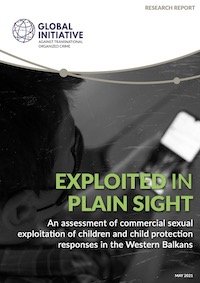By The Global Initiative Against Transnational Organized Crime’s Observatory of Illicit Economies in South Eastern Europe (SEE-Obs)
The Western Balkan Six (WB6) has historically not been at the center of attention and research investigating commercial sexual exploitation of children (CSEC). Despite a growing body of literature on human trafficking in southeastern Europe generally, there is little data on CSEC specifically. Information is rarely reported by local media, also because the patriarchal and traditional structure of societies in the Western Balkans fuels a widespread belief that sexual exploitation of children either does not exist or is an exception rather than the rule. Very few reports have therefore previously looked at the WB6’s role, its vulnerabilities, and its contribution to the CSEC phenomenon in a comprehensive way. At the same time as CSEC is gaining attention globally, societies and institutions in the Western Balkans continue to have low levels of awareness and capacity to take on the phenomenon. CSEC manifests itself in several interconnected forms in the WB6, including in the sex trafficking of minors, exploitation of children in travel and tourism, early and forced marriage, and sexual exploitation in venues such as brothels, bars, and strip clubs. It is also reflected in the creation and distribution of child sexual abuse materials (CSAM) online, including but not limited to the recording, live-streaming, sharing, and downloading of materials depicting minors being sexually exploited. There are also several overlaps between CSEC and other forms of exploitation, including labor exploitation (e.g., begging). Even before the COVID-19 pandemic hit the WB6, the region was recording an increasing number of CSEC cases. Given the lack of research and court data that could serve as a basis for analysis, there is no common profile of perpetrators involved in CSEC in the region. It seems that perpetrators are operating across the region without much scrutiny, facilitated by digital technologies and networks, the rise in tourism, and widespread weaknesses in the child protection system. Criminal actors also take advantage of the region’s socio-economic vulnerabilities and endemic marginalization, making various ethnic minorities even more vulnerable. This report assesses children’s vulnerability to CSEC across the WB6 and focuses specifically on online sexual exploitation of children and sexual exploitation of children in travel and tourism (SECTT). It also provides an overview of what law enforcement authorities, private companies, and civil society organizations are doing – and what they are not doing – to respond to, combat, and prevent the various manifestations of CSEC.
Geneva: SWIT: The Initiative, 2021. 96p.









